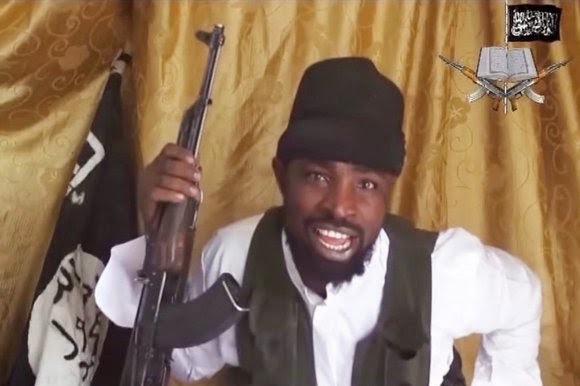Boko Haram leader Abubakar Shekau has threatened Cameroon in a video message on YouTube, warning that the same fate would befall the country as neighbouring Nigeria.
The video, which was posted on January 5, is directly addressed to Cameroon’s President Paul Biya after repeated fighting between militants and troops in the country’s far north.
“Oh Paul Biya, if you don’t stop this, your evil plot, you will taste what has befallen Nigeria … Your troops cannot do anything to us,” Shekau said in Arabic.
Shekau, in military fatigues and green rubber boots, speaks for more than 17 minutes in the video, flanked by four masked Boko Haram fighters, two of whom hold the militants’ black flags.
There was no indication when the video – entitled “Message to President Paul Biya of Cameroon” – was shot or where. It also used the group’s preferred Arabic name “Jama’atu Ahlis Sunna Lidda’awati wal-Jihad” or “People committed to the propagation of the Prophet’s teachings and jihad.”
Boko Haram roughly translates from the Hausa language widely spoken in northern Nigeria as “Western education is forbidden.”
In the video, Shekau praises his fighters “inside Cameroonian soil” and calls on Biya to “repent.” “If you do not, you will see what will come from Allah, the All-Powerful who has control over everything in respect of chastisement and calamity,” he says, waving his right index finger.
“Your troops are nothing. Even Nigerian soldiers couldn’t do anything to us.” He also calls on the people of Cameroon to “rebel against democracy and shun it.”
Paul Biya has been mentioned by Shekau before but it is first time that he has directly addressed Cameroon and is the first admission that Boko Haram has been actively operating in the country.
Boko Haram fighters had in the past launched attacks on northeastern Nigeria from bases inside Cameroon but recent months have seen an increase in strikes within Cameroon.
The attacks have taken a similar form to those in Nigeria from hit-and-run raids to kidnappings.
Boko Haram, which began its violent insurgency in 2009, has taken over swathes of territory in three northeastern Nigerian states, and declared some towns as part of its Islamic caliphate.
Last weekend, some insurgents captured the key town of Baga and the headquarters of the Multinational Joint Task Force in the Lake Chad area, tightening its control of the remote state of Borno.
Cameroon’s far north region, which adjoins Borno to the east, has come increasingly under fire and on December 28, Yaounde deployed fighter jets against Boko Haram for the first time.
Biya personally ordered the airstrike after the insurgents crossed the border and seized a military camp, the government said on December 29.
The aerial bombardment, hailed as a new phase in the counter-insurgency, forced the Islamists to flee, it was reported.
Cameroon’s president has made a series of strong statements against Boko Haram and in October last year vowed to go after the group “until it’s totally wiped out.”
In May last year, he said that a Paris meeting of Nigeria’s neighbors was designed to “declare war on Boko Haram.” But a key agreement at the summit to set up a regional force has yet to be implemented.
Cameroon has been increasingly vocal in its criticisms about the lack of a coordinated response against Boko Haram and called for support from neighboring countries.

